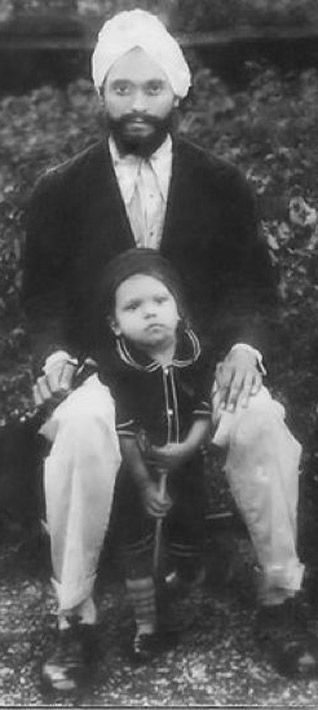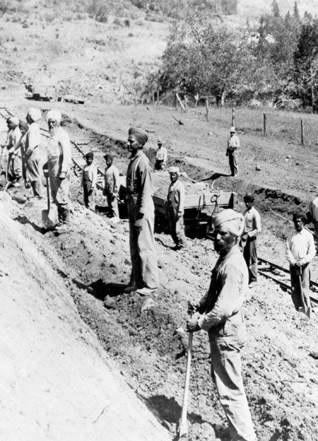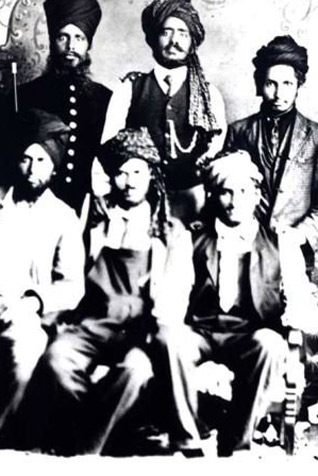History
The Punjabi Communities of Columbia River, USA
JOHANNA OGDEN
A new map drawn by Johanna Ogden shows 1910 Punjabi Columbia River communities from Hood River to Seaside, Oregon. By listing the name, religion, occupation, age, and political activities of men in these communities, it reconstructs a formerly invisible social landscape. Center for Columbia River History ("CCRH") 2010 James B. Castles Fellow, Johanna Ogden, created this map with Geographic Information Systems ("GIS") assistance from Gregory A. Greene.
RE-MARKING THE IMAGINATIVE LANDSCAPE
by Johanna Ogden
I collected the information illustrated in the map through various sources. I searched for the names Khan and Singh in the 1910 U.S. Census for Oregon and in city directories for Portland and Astoria; in Multnomah County Circuit Court document archives and in newspapers such as The Oregonian and St. Johns Review. Indian historical accounts also provided names of activists and the towns in which they operated.
Finally, my accounting, minus the names and life details, of Punjabis living along the Columbia River are roughly corroborated by the total of men reported present by R.K. Das in his 1923 report entitled, Hindustani Workers on the Pacific Coast.
I hope this map is jarring.
Today, most people know nothing about the historical presence of Punjabi communities along the Columbia River. But Punjabis were not invisible people during their time in Oregon. They worked side-by-side with other men; storekeeps sold them produce and bank tellers took their money. Townspeople sold them land and title clerks recorded the purchases. Wardens listed them as prisoners. Local sports pages covered inter-ethnic wrestling matches that included Punjabi competitors.
Mainstream and radical newspapers reported on riots against them and on Punjabis’ desire to overthrow British rule in India. But today scant records exist, take extreme effort to locate and haven’t been used by historians in the United States.
Ironically, Indian historians provided a roadmap to the tiny Oregon towns -- Winans, Bridal Veil, Astoria -- where Punjabis lived, worked and organized. I am indebted to those scholars who detailed, from the other side of the globe, the political activities of men they consider heroes for their formation of the Ghaddar Party. They led me to look more closely at the region’s archives.
If Oregonians then were aware of the Punjabis’ presence why is this story largely unknown today?
Historical silences occur through the exercise of shared assumptions and work in devastatingly simple and effective ways.
White "pioneers" are termed Oregon Country’s "first settlers," despite large and longstanding Native communities that preceded them. Logs of “pioneer” names or of local deaths don’t list the name “Singh” despite their having been neighbors or co-workers. Sheriff’s arrest ledgers, where “nativity” contrast “American” with Jew, Negro, or Punjabi, likewise expose and reinforce a certain notion of belonging.
A thousand seemingly benign acts of erasure undergird and feed the persistent myth of Oregon as a white pioneer land. The result is that many of the immigrants whose labor made the American or Canadian West are perpetual outsiders, historical sidebars or simply forgotten altogether.
Although I have written thousands of words about the forgotten Punjabi communities of the Columbia River, for me this map is central. With it I want to place the Punjabi community back into the Northwest landscape and challenge us to rethink the narratives about who we are.
[Courtesy: Center for Columbia River History. Edited for sikhchic.com]
July 20, 2012
Conversation about this article
1: Harish Puri (Ludhiana, Punjab), July 21, 2012, 1:49 AM.
We are grateful to Johanna Ogden, the Centre for Columbia River History and the Oregon Historical Quarterly who together made this fantastic connection with this hidden chapter of our past. Three cheers.






